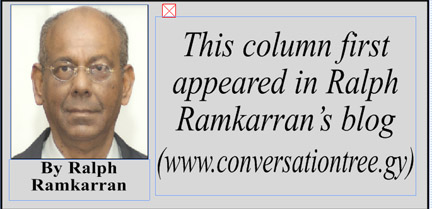 In 1838, as former slaves were celebrating the abolition of slavery the British colonial empire, Jesuit priests of Georgetown University in Washington DC, in the US, were selling 272 slaves to Southern estates to raise funds for the university. This trade in human degradation lasted until 1865 when the institution of slavery, one of the worst crimes against humanity, was formally abolished in the US.
In 1838, as former slaves were celebrating the abolition of slavery the British colonial empire, Jesuit priests of Georgetown University in Washington DC, in the US, were selling 272 slaves to Southern estates to raise funds for the university. This trade in human degradation lasted until 1865 when the institution of slavery, one of the worst crimes against humanity, was formally abolished in the US.
After much public pressure Georgetown University announced during last week, as recommended by a report it had commissioned, that it would offer a public apology, and would rename two halls Isaac Hall for Isaac Hawkins, one of the slaves sold, and Anne Marie Becraft Hall, in honour of a 19th-century educator who founded a school for black girls in Washington. It would also give priority in admission to descendants of the 272 slaves whose names were recorded and some of whose descendants have been or are being traced.
The vast impact and consequences of slavery constitute an important part of the continuing discourse of the African condition, reparations and compensation in countries where slavery existed. In the Caribbean these discussions take place in the absence of the beneficiaries of slavery, who are to be found in the UK. In the United States, however, they are identifiable, as in the case of the 272 slaves sold by Georgetown University.
In the Caribbean the argument for reparations as compensation for slavery, which is supported by governments and people of the region, has been making progress in that it is gaining wider recognition. But it has yet to make any impact on British public opinion. This is necessary in order to obtain movement from Britain towards recognition of the right to reparation. Little or no work is being done in this regard and thus the British political class sees no negative consequences in its continued refusal to recognize the rights of the descendants of slaves.
In Guyana one aspect of the discourse that has been around for decades is the issue of African land rights. Many have confused this debate by introducing the concept of African entitlement to ancestral lands, when they are in fact referring to land for which they already have communal titles or have occupied under licence as ‘Crown lands.’ Some may be exploiting the opportunity to claim additional lands but that is another issue. There is hardly likely to be any objection to giving title to land to Guyanese of any ethnic persuasion who have been occupying and utilizing land for generations.
But generally, African Guyanese are not claiming land belonging to others and, except for a claim made by Eric Phillips recently, have not claimed land from the state as compensation for slavery. Of the hundred or so estates that were purchased, which formed the core of the village movement, much of the title was given communally. The expectation is that occupants of the communal lands would be granted individual titles subject to the laws of succession and prescription. As demonstrated below, Guyana already has the legal infrastructure to resolve these problems.
The claim made by Mr Eric Phillips of ACDA, who is also Chair of the Reparations Committee, is that Africans were here since the 17th century, before some Amerindian groups such as the 300 WaiWais who arrived in the 19th century from Brazil and have one million acres and the Wapishanas who arrived in the 18th century and are now claiming more than they already have. Phillips pointed to the contribution of African slaves to the building of Guyana’s infrastructure, the suffering they endured and the inequitable distribution of mining and other lands. This is a more controversial proposition and would require far more debate than the resolution of existing land issues.
The PPP and the PPP/C government lost a golden opportunity of earning the goodwill of the African community by failing to support the establishment of an African Lands Commission. In a debate in the National Assembly during July 2007, on a motion in the name of the late Debbie Backer of the PNCR, marking the bicentenary of the abolition of the African Slave Trade and proposing the establishment of an African Lands Commission, the government recognized the issues to be resolved but amended the motion to remove the establishment of the commission. No sensible or rational explanation was given for this posture. In fact, the overall contribution of government members pointed to the need for the commission.
The Ramotar government in August 2013 resolved similar, but more recent, problems of residents of Bath Village, Berbice. He described the problems thus: “…historic problems which has (sic) been in the making for a long time whereby lands were given out to people and some of them sold out but no title was passed to them while some died out and some migrated and in the meantime, over the years, it was festering and beginning to cause some problems in the community itself.” The President found $46 million for the process of declaring a registration area, surveying and granting titles. A similar solution is available for African lands.





